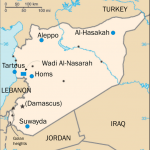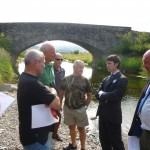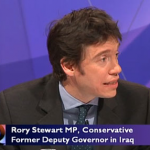Syria
Why should chemical weapons have changed our response to Syria this week? After all for two years, Syria has been a place where we have felt both that we ought to intervene, and also simultaneously that we cannot intervene. Hundreds of thousands have been killed, millions made refugees. The regime is backed by Hezbollah, Iran and Russia. The rebels are backed by Saudi and Qatar, and have a fighting core which is an Al Qaeda affiliate. It desperately needs a political settlement between the more moderate parts of the regime and the more moderate parts of the opposition, to balance the very different components of Syrian society. But that would require, not just extraordinary political imagination, but the active support of Iran, Saudi Arabia, Qatar, and Russia. Failing that very uncertain scenario, Syria faces terrifying futures: a victory for Bashar, a victory by the more unpleasant parts of the opposition, or – perhaps worst of all – a continuing civil war, with no victor, and no end. The West, however, has limited power in Syria. The traditional tools of intervention, of an Afghan, or even Libyan sort – full arming of rebels, no-fly zones, missile strikes, or invasion– would be, at best, only indirectly relevant to that political settlement. And a military intervention would be far more difficult than in smaller, less well-defended Libya. As always, ought implies can: we don’t have a moral obligation to do what we cannot do.
So why should the Syrian government firing chemical weapons have made any difference to the West’s response? There are three reasons why it shouldn’t; and one why it should. The first would be that the weapons finally provided an opportunity for intervention, which could topple the Bashar regime, and thereby help to stabilise the Middle East. It is extremely unlikely, however, that we would be able to control such an outcome. And any such strategy, even if conceivable, would require very careful and patient exposition; it should not simply be forced through, without full public discussion, on the basis of a convenient excuse. The second reason for action might be that the President Obama made the use of chemical weapons ‘a red line’; and he has to follow-through on his threats to retain his credibility. But this, although a rationale for American action, would not in itself be a justification for British involvement. The third might be that the attack, regardless of chemicals, was an extreme atrocity against the civilian population, whom we have a ‘responsibility to protect’. But if that were the reason, why did we not act on the many other occasions when the Syrian regime has killed thousands? The answer remains that the West lacks the capacity to significantly improve Syrian lives, and nothing this week has changed that.
There was however one good reason to respond, despite what Parliament decided on Thursday night. This was because Bashar used chemical weapons– a uniquely horrifying weapon, which the international community has outlawed. This is a difficult argument to accept. Why should there be a difference between a chemical weapon and anything else? Surely what matters is only the number killed, and we should be ‘neutral’ on what technology is employed? No. The Laws of War, which we have developed slowly since the early Middle Ages, are based on the principle that certain acts, regardless of the number of casualties, are intrinsically abhorrent. Critics point out that this system can be piecemeal, subjective, and inconsistent. War continues to be hell: and there are many particularly horrifying weapons– such as cluster bombs – which remain in use. But that is an argument for widening the circle of what is prohibited, not narrowing it.
Take landmines. Of course, you can kill more people with bullets or even machetes. But the banning of landmines, because of their indiscriminate barbarity, has been an important victory for civilisation. We were right also to ban chemical weapons, and nuclear weapons, not because of the number of people they kill but in part because of their dispersal, their potential, and their method of killing. This atrocity is an opportunity to reinforce the international condemnation of chemical weapons. Even Iran has condemned the attack. Regardless of the vote, we should still work to ensure that countries like Brazil and India take a much stronger position of condemnation.
The Syrian regime’s apparent use of this unholy weapon shows a willingness not just to ‘cross red lines’, but also to flout international law, which is terrifying in its implications for their people and the region. The international community should, I believe, respond, but its response must meet three conditions. First, it should not make the situation in Syria worse for the civilian population. Second, it should seek to deter Bashar from ever using chemical weapons again. Third, even if it fails to do that – and it may – it should send a clear message to deter any other regime, which is tempted to use chemical weapons.
Thursday’s vote in the House of Commons was both moving and troubling. Britain has learned the lessons of Iraq, but it’s in danger of over-learning them. The alternative to grand interventions should not be simply inaction. It is possible, as we showed in Bosnia, and even in Kosovo (where there was no UN approval) to improve the lives of other people and support a better international order. Caution must be the first instinct. But we should be proud of the work we’ve done together to ban the use of chemical weapons, and our recent humiliations should not make us give up on the project of arguing, and even sometimes fighting, to defend and develop those moral principles.













